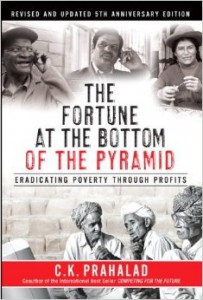
C. K. Prahalad
5.0 out of 5 stars Nobel-Level Work Essential to Understanding Our Bright Future, October 29, 2014
Sadly, the author is deceased. I have always considered him a contender for the Nobel Prize.
I am upset with Amazon for not carrying over reviews from past editions — new readers are advised to look up older editions of any books if they wish to take advantage of some of the extraordinary material provided by past reviewers. I will not replicate those other reviews — they are worth finding.
This book review should be read together with my review of Stuart Hart's Capitalism at the Crossroads: Next Generation Business Strategies for a Post-Crisis World (3rd Edition) which points to several other related books, and Kenichi Ohmae's book,The Next Global Stage: Challenges and Opportunities in Our Borderless World (paperback). All three are published by Wharton School Publishing, which has impressed me enormously with its gifted offerings.
Here's the math that I was surprised to not see in the book: the top billion people that business focuses on are worth less than a trillion in potential sales. The bottom four billion, with less than $1000 a year in disposable income, are worth four trillion in potential sales.
In combination, Prahalad and Hart make it clear that business suffers from the same pathologies as the Central Intelligence Agency and other bureaucracies: they are in a rut.
I will end by emphasizing that I believe this author merits the Nobel Peace Prize. As the U.S. Department of Defense is now discovering, its $500 billion a year budget is being spent on a heavy metal military useful only 10% of the time. Stabilization and reconstruction are a much more constructive form of national defense, because if we do not address poverty and instability globally, it will inevitably impact on the home front. This author has presented the most common sense case for turning business upside down. He can be credited with a paradigm shift, those shifts that Kuhn tells us come all too infrequently, but when they come, they change the world. It may take years to see this genius implemented in the real world, but he has, without question, changed the world for the better with this book, and make global prosperity a possibility.
Note: while this book is totally unique there are several other books that have given me enormous hope, and I list them below [my eight remaining allowed links — for a vastly broader organized collection of collections of reviews, visit Phi Beta Iota the Public Intelligence Blog page Books (all reviews there lead back to their respective Amazon pages):
One from Many: VISA and the Rise of Chaordic Organization
Democracy's Edge: Choosing to Save Our Country by Bringing Democracy to Life
Escaping the Matrix: How We the People can change the world
The Tao of Democracy: Using Co-Intelligence to Create a World that Works for All
Infinite Wealth: A New World of Collaboration and Abundance in the Knowledge Era
The Wealth of Networks: How Social Production Transforms Markets and Freedom
The Wealth of Knowledge: Intellectual Capital and the Twenty-first Century Organization
Revolutionary Wealth: How it will be created and how it will change our lives
Best wishes to all,
Robert David STEELE Vivas
THE OPEN SOURCE EVERYTHING MANIFESTO: Transparency, Truth & Trust




